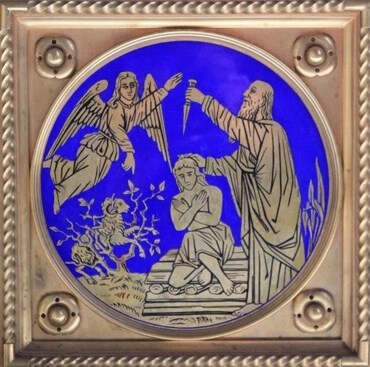Apocalypse Explained #494
494. Verse 4. And the smoke of the incense with the prayers of the saints ascended out of the angel's hand before God, signifies the conjunction of all with the Lord. This is evident from the signification of "the smoke of the incense" as being the truths of spiritual good (of which presently); also from the signification of "the prayers of the saints," as being truths from good with those who were to be separated from the evil and saved (of which above, n. 493; also from the signification of this "angel" as being heaven (as above, n. 490; therefore "out of the hand of the angel" means by means of heaven; also from the signification of "before God," as being to be conjoined with the Lord (See above, n. 462, 477, 488); therefore "the smoke of the incense with the prayers of the saints ascended out of the angel's hand before God" signifies the conjunction of all with the Lord effected by means of heaven. "The smoke of the incense" signifies truths from spiritual good, because "frankincense," from which the smoke came, signified spiritual good, and the "fire" with which the frankincense was kindled signified celestial good; thence the "smoke" ascending therefrom signifies truth from good, for all truth proceeds from good. This is why "smoke" became representative; "the smoke of the incense," which was agreeable from its fragrance and sweet odor, was a representative of truth from good; for "fragrance and sweet odor" signify what is agreeable and acceptable (See above, n. 324). "Smoke" has a similar signification in Moses:
The sons of Levi put smoke in Thy nostrils, and a whole burnt-offering upon Thine altar (Deuteronomy 33:10).
"The sons of Levi" mean those who are in truths of spiritual good; these truths are signified by "smoke," and celestial good is signified by "the whole burnt-offering." The smoke of incense is also called "a cloud of incense" (Ezekiel 8:11). Thence also "smoke" in the contrary sense signifies falsity from evil (in Isaiah 34:10; Joel 2:30; Nahum 2:13; Psalms 18:8; 37:20), because the fire that makes such smoke signifies the evil of love.
Catch

Catching" is used in a variety of ways in the Bible, both positive and negative. Thieves get caught; the Egyptians caught up with the Children of Israel at the Red Sea; a ram got caught in a thicket for Abraham to sacrifice instead of sacrificing Isaac.
In a more positive sense, Jesus caught Peter when Peter was walking on water and started to sink, and the baby in Revelation was caught up to heaven before the dragon could eat him.
In all these cases, both positive and negative, being caught represents a communication and even conjunction between spiritual states. Sometimes it means higher states get ensnared in the falsity and evil of lower states; sometimes it means higher states reach out to and elevate lower ones by sharing deeper truths and describing more exquisite desires for good.






